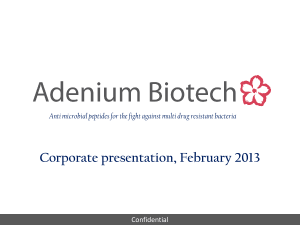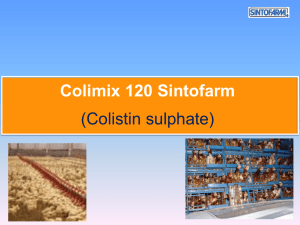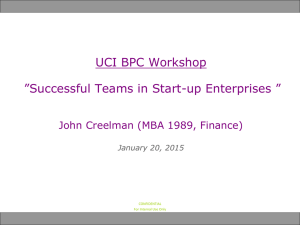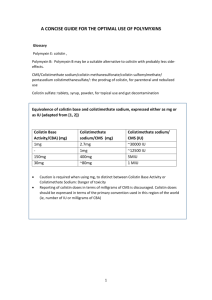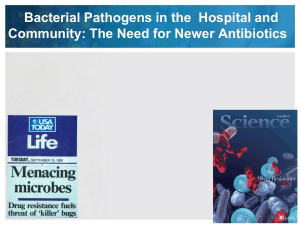AA139 - Adenium Biotech
advertisement
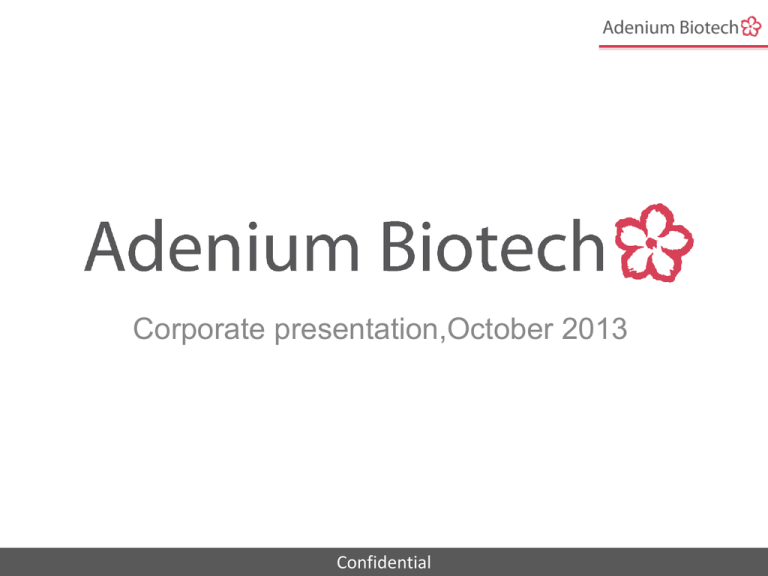
Corporate presentation,October 2013 Confidential Ideal Target Product Profile for multidrug resistant broad spectrum Gram-negative antimicrobial • • • • • • Novel mode of action Bactericidal Selective and specific Low frequency of resistance Active against GAIN pathogens Drugable Confidential 2 Arenicin selection process > 500 organisms screened for antimicrobial activity Several G+ but only one Gidentified ! Clin Cand – AA139 ~40 AMP’s identified Confidential 3 Mode of action summary • Arenicin acts at least partly due to non-lipid Amediated penetration and disruption of both Gram negative membranes • Inhibition of cytosolic processes in protein synthesis suggested in TraDIS studies • Arenicins mode of action is different from Colistins Confidential 4 Arenicin interacts with the lipid transporter protein MLAC • MlaC is a periplasmic binding protein maintaining phospholipid homeostasis of the dual cell membrane • Gene analysis of E.coli shows that an MlaC L11R mutation is required to prevent the interaction between Arenicin and MlaC • Resistant strains regain sensitiviy to Arenicin as mutant is not stable Confidential 5 Arenicin causes loss of cell surface structure and partial cytoplasm clearing in E. coli Transmission Electron Microscopy (TEM) of the Arenicin effect on E.coli (ATCC 25922) E.coli. No treatment. Black arrow, cytoplasmic membrane; Red arrow, outer membrane; Green arrow, pili. Bar, 200 nm E. coli incubated with 32 μg/mL NZ17000 for 40 min induced loss of cell surface structures and partial clearing of cytoplasm Bar, 200 nm University of Queensland 2013 Confidential 6 Arenicin causes ATP release without dramatic changes in cell morphology Extracellular ATP after 10 min Fold change 25 20 Ar 15 col 10 pip 5 0 0 At OD600 =0.4 E.coli cells were exposed to 32ug/ml Arenicin, 64ug/ml Fosfomycin and 16ug/ml Polymycin B. Even at very high concentration of Arenicin-3, no dramatic morphological changes of the cells were observed. 16 64 256 x MIC 1024 4096 Arenicin-3 (Ar), colistin (col), and piperacillin (pip) induced release of ATP from E. coli. Exponential cells were incubated with drug for 10 minutes and ATP measured. y-axis is fold change relative to untreated (0xmic) and x-axis is fold MIC applied. Novozymes A/S, 2010 Confidential 7 Arenicin and Colistin have different effects on osmotic shock genes Symbol Gene Colistin Arenicin µg/ml ID µg/ml 2½ 2½ 5 10 Description Osmotic shock genes osmB B1283 osmC B1482 osmY B4376 osmE B1739 bdm B1481 63 10 5 3 63 29 11 8 6 3 3 lipoprotein, osmotically inducible, Peroxiredoxin Osmotically-inducible protein Y precursor Osmotically-inducible lipoprotein E precursor Biofilm-dependent modulation proteinosmotically inducible sra rcsA 11 6 4 2 3 - - rpsV, osmotically inducible positive regulator for ctr capsule biosynthesis, B1480 B1951 Whole Genome TraDIS preliminary data suggest inhibition of key cytosolic processes in gene translation Novozymes A/S, 2010 Confidential 8 In vitro efficacy summary • • • • • • • • • Potent in vitro activity against GAIN pathogens Rapidly bactericidal – MBCs ~ MICs Extremely low spontaneous mutational frequency Small and mostly reversible increase of MIC in serial passage studies comparable with Colistin Little inoculum effect Moderate effect of serum on MIC Limited effect of Survanta on MIC No synergistic or antagonistic effect with other antibiotics No cross resistance with strains with acquired resistance to Colistin Confidential 9 Potent in vitro activity against GAIN pathogens MIC90 determinations (MDR clinical isolates) # strains AA139 Colistin Meropenem Ceftazidime Ciprofloxacin Gentamicin Tigecycline N=325 MIC (µg/ml) E.coli N=55 1 0.25 4 >32 >4 >32 0.5 K.pneumonia N=75 4 8 >16 >32 >4 >32 4 P.aeruginosa N=75 8 2 >16 >32 >4 >32 ND A.baumanii N=120 2 8 >16 >32 >4 >32 4 Eurofins medinet 2012 Confidential 10 Extremely low spontaneous mutational frequency to Arenicin Resistance Frequency (4XMIC) Resistance Frequency (8XMIC) Organism Isolate ID AA139 AA139 E. coli ATCC 25922 ≤2,50E-12 ≤2,50E-12 E. coli 3083559 ≤8,90E-11 ≤8,90E-11 K. pneumoniae 3083832 ≤4,16E-10 ≤4,16E-10 K. pneumoniae 3083583 ≤1,38E-11 ≤1,38E-11 P. aeruginosa ATCC 27853 ≤2,61E-12 ≤2,61E-12 P. aeruginosa 3083655 ≤2,68E-12 ≤2,68E-12 A. baumannii 3083835 ≤2,65E-12 ≤2,65E-12 A. baumannii 3083684 ≤4,80E-10 ≤4,80E-10 Eurofins medinet 2012 Confidential 11 Limited effect of mucin (Survanta) on in vitro efficacy NBS plates- MHB only GN_01 E.coli ATCC 25922 GN_03 K. pneumoniae ATCC 700603 GN_04 K. pneumoniae ATCC 13883 GN_34 A.baumannii ATCC 19606 GN_42 P.aeruginosa ATCC 27853 GN_43 P.aeruginosa Polymixin R GN_44 E.coli ATCC 10536 GN_45 K. pneumoniae BAA_2146 Compound ID MIC [μg/mL] Colistin MCC_000094B Ciprofloxacin MCC_0 00166 AA139 ≤0.03 ≤0.03 ≤0.03 0.03/0.06 1/2 32/64 0.03/0.125 0.06 ≤0.03 0.25 ≤0.03 0.5/1 2 0.25/0.5 32/64 >64 0.06 0.5 0.125/0.25 0.125 0.25/0.5 2 0.125 1/2 NBS plates- MHB + 5% Survanta Compound ID Colistin MCC_000094B Ciprofloxacin MCC_0 00166 AA139 MIC [μg/mL] 0.06 1/0.5 0.125 0.5/0.25 0.5 64 0.5/0.25 0.125 ≤0.03 2 0.5 >64 1 1 2/1 >64 0.125/0.06 0.125 0.5/0.25 2 0.5 16/8 0.5/0.25 2 8x MIC increase Decrease in MIC University of Queensland 2013 Confidential 12 Pharmacokinetic/pharmacodynamic summary • • • • Arenicin efficacy is driven by Cmax Clinical therapy should thus be based on slow bolus injection Hepatic clearance does not seem to play a role AA139 has a good volume of distribution corresponding to the extracellular volume • AA139 has a half life of 4.3 hours • AA139 has a low penetration into ELF (<5%) Confidential 13 PK/PD dose fractionation study shows that Cmax drives the efficacy of Arenicin (NZ17230) (5mg/kg over 3 days seems to exert maximal effect) Tissue burdens following infection with E. coli UT189 1.00E+07 1.00E+06 1.00E+05 CFU/mL homogenate 1.00E+04 1.00E+03 Kidney 1.00E+02 Bladder 1.00E+01 Urine 1.00E+00 1.00E-01 PreTreatment Q36h Q18h Q12h Q8h NZ17230 3mg/kg NZ17230 3mg/kg NZ17230 3mg/kg NZ17230 3mg/kg Euprotec 2013 Confidential 14 In vivo efficacy summary • Excellent efficacy against K.pneumoniae and E.coli in UTI with ED50 of 0.5-1mg/kg (BID I.V. administration) • Modest efficacy against K.pneumoniae, P.aeruginosa and A. baumannii in pneumonia based on QID I.V. administration • Very good efficacy against K.pneumoniae in pneumonia based on aerosol administration Confidential 15 Excellent efficacy in UTI ED50 for AA139 in the bladder E. coli K. pneumonia 7 log10 cfu/g bladder 6 5 4 3 ED50 1.7 mg/kg 2 -1.0 -0.5 0.0 0.5 1.0 1.5 log10 [AA139] mg/kg Euprotec 2013 Confidential 16 Very good activity of Arenicin against K. pneumonia in a neutropenic pneumonia model following aerosol admin Klebsiella Pneumonia NCTC13442 Variant log reduction MIC AA139 -3.89 1 Colistin -1.75 1 Euprotec 2013 Confidential 17 Toxicological summary • • • • • Selective and specific for bacteria Wide therapeutic window – a factor of 25 MTD level of 25 mg/kg versus ED 50 of 1 mg/kg Adverse effects related to histamin release Changes in proximal tubuli the only, dose dependent and reversible pathological finding • Changes in NGAL correspond with pathological kidney findings • No cardiotoxic effect Confidential 18 Product profiles of Meropenem, Colistin and Arenicin Indications Meropenem Colistin Arenicin Pneumonia Complicated urinary tract infections Coverage +++ +++ +++ +++ +++ +++ XDR E.coli ++ +++ +++ XDR P.aeruginosa ++ +++ +++ XDR A.baumannii + +++ +++ KPC K.pneumonia - +++ +++ Colistin G- Bacteria - - +++ Oral no no no IV yes yes yes IT no yes yes (yes) yes (no) Neurological no yes no Hypersensitivity yes yes yes yes yes yes Administration Adverse events Renal/Hepatic Miscellaneous Bactericidal Confidential 19

